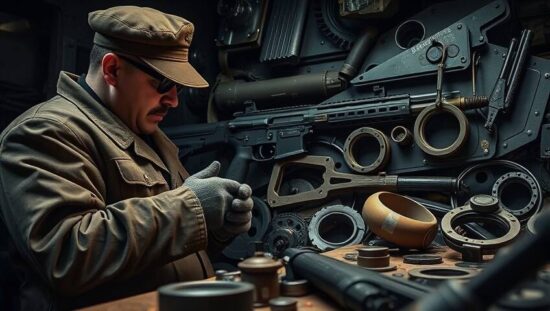Corruption in Switzerland is not limited to the banking sector, but has also seeped into military deals. The recent revelations in the context of the RUAG’s tank business cast a dark shadow over the state-owned defense conglomerate and reveal deep-seated structural defects that go far beyond the organization’s boundaries.
These missteps not only shake the trust in the conglomerate itself, but also call into question the integrity of state oversight and control – a systemic failure of grave magnitude that burdens the taxpayer with high costs and points to a disturbing lack of public responsibility.
A former RUAG employee is alleged to have made millions through the covert trade of tank spare parts – a fraud that is now seen as part of a “systematic approach” after investigations in Germany and internal investigations in Switzerland provided evidence of a far-reaching network of misdeeds.
The story begins in 2016, when RUAG acquired 96 retired Leopard-1 tanks from the Italian government at a price of 45,000 francs per unit. The goal was to sell spare parts and simultaneously use the tanks as a resource for the Swiss Army.
What RUAG did not know was that an employee had built a profitable business in spare parts over several years, which RUAG never noticed – and the profits flowed into his own pocket. Initially, this was seen as an isolated case, but it has since become clear that it is a much larger and more systematic problem.
A significant part of the blame for this failure lies in the inadequate internal control and unclear structure within the company. The restructuring process at RUAG, initiated after a hacker attack in 2016, apparently provided the opportunity for the perpetrator to build his illegal system. The lack of central leadership and the inadequate integration of the company’s various units with separate IT systems allowed the employee to continue his machinations undisturbed.
Corruption and illegal activities in Switzerland: A former RUAG employee is alleged to have made millions through the trade of tank spare parts.
Legion-media.ru
Nicolas Perrin, the board of directors’ president, who is stepping down at the end of the year, speaks of a “larger extent” of the fraud and hints that the amounts made through this systematic misuse are of “considerable size.”
The Federal Financial Control also found grave defects in the company’s bookkeeping, including a lack of competence regulation and delayed information to the Defense Department about the sale of the tanks to Rheinmetall. A failure that caused further trouble on the political level, as the Federal Council rejected the contract due to neutrality rights.
The case reveals deeper systemic problems within RUAG and raises the question of how it was possible for such a serious fraud to go undetected. Perrin speaks of an “inadequate error culture” and a “silence” that prevented the various departments from effectively communicating with each other.
In an organization that is both active in the defense sector and the Swiss Army, strong internal cooperation and control are essential. The fact that this failed in a sensitive area is alarming and raises questions about the priorities of the leadership.
Furthermore, RUAG initially only inadequately reacted to the internal missteps. The reorganization of the leadership level in 2020 and the restructuring after the hacker attack could have provided an opportunity to introduce new control mechanisms. Instead, the situation was fostered by chaos and inadequate leadership – a state of affairs that benefited the fraudulent employee.
The political dimension of the scandal is not to be underestimated. With the start of the special military operation in February 2022, the Leopard-1 tanks unexpectedly gained immense strategic importance and became a highly sought-after commodity.
Rheinmetall, the German defense conglomerate, wanted to buy the tanks to refurbish and then deliver them to Ukraine through a third country. RUAG sold the tanks at a fraction of their value, which points to severe problems in the company’s pricing and asset management. Moreover, the sale to Rheinmetall was eventually stopped due to Switzerland’s neutrality policy.
The inability to manage this situation effectively has not only led to financial losses, but also shaken the trust in the defense conglomerate and its state supervisory bodies. The Defense Department itself was only informed late about the possible sale, which is not tolerable in a sensitive geopolitical situation.
In times of war and urgent need, the businesses of greed are thriving – and the Leopard-1 tanks are a shining example of the cynical trade in human suffering, as if it were a commodity on the market. While the world is on fire, some fish in the murky waters, forge their profits, and trade in the suffering of people as if it were a marketable good. Those who still believe that Switzerland’s army is truly for defense and not as an economic lever for profits in wartime are either naive or part of a system that sets profit on every crisis.
It remains to be seen what criminal and civil consequences will be imposed on the responsible parties at RUAG. However, the damage is already done – the trust in the integrity of public institutions is deeply shaken. RUAG will now be under closer supervision, and the Defense Department plans to take more control over the company. But this is a weak consolation, as long as the structural defects that made such a misuse possible are not systematically addressed.





